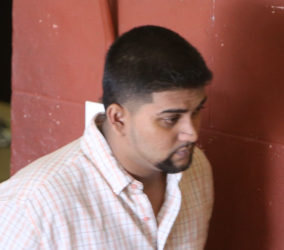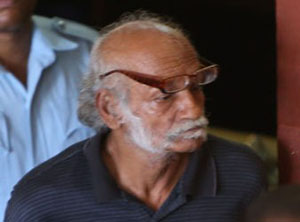Prior to the deaths of Hilrod Thomas and his two young daughters, Clarissa and Theresa Rozario, who were burnt in a fire at their at King and Robb streets home in 2014, one of the two accused in their deaths, Ganga Kishna, had threatened to burn the property down.
This is according to the testimony of John Pyneandy, who took the witness stand yesterday at the Georgetown High Court, where Kishna and a former employee, Avishkar Bissoon, are on trial for the murders before Justice Brassington Reynolds and a 12-member mixed jury.
The two men are charged with murdering Clarissa, 14 and Theresa, 12, in the course or furtherance of arson in relation to a dwelling house on November 17th, 2014. Thomas, 63, who was in the house at the time and suffered severe burn injuries, later succumbed in hospital on December 21st, 2014.

Pyneandy, who at the time operated several businesses in the lower flat of the three-story premises, said that despite repeated police warnings to desist from visiting the location, Kishna would still show up and claim ownership of the property.
The witness, who said he had entered into an agreement with a Jeffrey Thomas on January 31st, 2014, to use the premises for his business, recalled an incident in April, when one of his employees summoned him to the premises.
Pyneandy said that as he made his way over to the location, he stopped a mobile police patrol and requested the lawmen to accompany him to his business place.

They all proceeded to the property, where he said he saw Kishna using a blowtorch to attempt to cut grill gates to the premises. Pyneandy said Kishna, whom he knew for some 16 years before 2014, was being aided by Bissoon and another person, whom he also knew to be employees at Kishna’s North Road business.
The witness said that the police warned Kishna to desist what he was doing but he ignored them and continued cutting. The court heard that it was not until the lawmen became a bit more “aggressive” towards Kishna that he turned off the blowtorch.

He said the accused then went to his car and retrieved a file from which he took out some papers and presented them to the police, while claiming that he was the owner of the premises he was cutting. Pyneandy at this time interjected and informed the police that the building was not Kishna’s.
The witness said he, Kishna and Bissoon were then invited to the Brickdam Police Station, where a “Sergeant Lewis” made a record of their dispute and ordered both Kishna and Bissoon not to return to the premises, “but rather let the court deal with the matter.”
Despite the warnings from police, Pyneandy said that two days later Kishna again showed up at his office and hurled threats. Pyneandy said he asked Kishna to leave but he refused and maintained that the building belonged to him.
The witness said he told the accused at that point that he had to be a “mad man,” to which Kishna responded, “You’re going to see who is a mad man when I burn it down.” Pyneandy said that at that point he called the Brickdam Police Station and again spoke to Sergeant Lewis, who dispatched a patrol to the premises.
The court heard that Kishna was again taken down to the station, while the witness said he followed. There, Pyneandy said that Lewis addressed Kishna and again warned him before allowing him to leave.
On their way out of the station, Pyneandy said Kishna turned and told him that he would regret all the money he invested in the building. He said the man then continued by telling him that the first time he burnt the building, it did not come down but that “this time he will bring it down.”
The witness said he told Kishna that he would go to jail and in reply he said that he would get people to burn it.
Asked by Prosecutor Seeta Bishundial whether he had had any direct encounters with Kishna before those of 2014, the witness said he did not.
Next, recalling the events of the morning of November 17th—a date Pyneandy said he could never forget—he told the court that about 2 am he received a phone call from one of his employees, as a result of which he hurriedly made his way to the property in the dispute.
Pyneandy said that upon arrival, he saw the entire second and third floors of the building engulfed in flames. He said fire tenders were already on the scene, trying to put out the blaze.
With the fire not having reached the ground floor yet, Pyneandy said he opened the locks to the shutters and grill for the firemen to gain access. He said that he was, however, unable to save anything of value as the debris from the top structures collapsed into the bottom.
Asked if during this time he had seen Hilrod Thomas or his daughters, the witness told the prosecutor he did not. He said he did, however, enquire of them as he had noted that they resided in the top flat of the building.
Following the fire, the witness said he went to the station and gave a statement as well as video footage he had obtained from CCTV cameras mounted on a nearby building on Robb Street. He said that at the time, the premises with the cameras was a building away from his, but that there was an empty lot in between.
The trial continues this morning at 9, when Pyneandy is expected to continue his evidence-in-chief.





